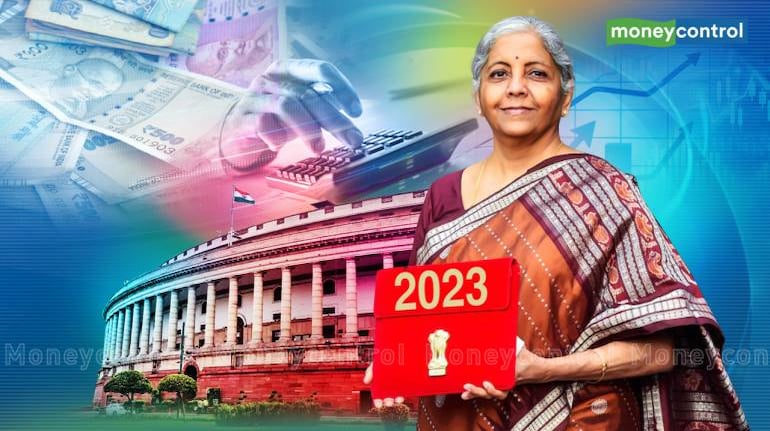



Finance minister Nirmala Sitharaman recently said that she understands the challenges that the middle-class faces.
This appears to have raised hopes among some taxpayers and tax experts that Budget 2023 might reward the middle-class, also because this is the last full-year budget before the 2024 general elections.
However, it remains to be seen if the finance minister grants taxpayers their wishes or saves the ‘best’ for the last, as was the case during the interim budget in 2019.
Also Read: Allow routine medical expenses as tax deduction under section 80D
Here’s what the middle-class, the average taxpayer, really wants.
Hike limit on equity long-term capital gains
At present, individual equity investors do not have to pay tax if they clock long-term capital gains on stocks and equity mutual funds of less than Rs 1 lakh in a financial year. Beyond this threshold, they have to shell out tax on the capital gains at the rate of 10 percent.
Tax experts told Moneycontrol this limit is inadequate and ought to be raised to Rs 2.5 lakh or higher to account for inflation, rising income levels and to encourage more investors into equity markets.
Raise basic exemption and section 80C limits
The basic exemption limit of Rs 2.5 lakh (for individuals under 60) was last raised in Budget 2014, immediately after the Narendra Modi government was formed. However, despite the rise in inflation, the government has not revised this limit.
Likewise, the section 80C limit of Rs 1.5 lakh has remained the same since then. Some experts said it is time to hike these limits and offer relief to middle-class taxpayers. Also, tax deduction on medical expenses ought to be extended to all, irrespective of age groups and insured status.
Amid layoffs, particularly in the tech space, the young working population is looking forward to a hike in standard deduction (Rs 50,000) and lower tax rates.
Relief on capital gains on debt investments
Investors want the finance minister to reduce tax rates on capital gains booked on debt investments. Long-term capital gains on debt funds are taxed at 20 percent and short-term capital gains as per the slab rate of the investor.
However, interest rates nosedived during the pandemic and inflation surged. Even though interest rates have inched up in the past year, there is talk that rates will trend down in the medium to long term. Expectations of low interest rates later and the current high rate of taxes leave very little in the hands of investors after tax.
Also Read: Mutual funds seek tax parity with insurance companies' products
Include unavoidable expenses in new regime deductions list
The older, with-tax-exemptions regime offered tax relief on home loan principal repaid (up to Rs 1.5 lakh) and interest paid (up to Rs 2 lakh) under Sections 80C and 24, respectively. Also, taxpayers who live in rented accommodation could claim exemption on house rent allowance received from employers.
However, the new regime has done away with these tax sops. Since these are unavoidable expenses, it makes sense to allow these deductions under the new regime, too, tax consultants said.
Also, those under 60 could claim deductions of up to Rs 25,000 under Section 80D on health insurance premiums paid. In addition, if you paid premiums for your senior citizen parents’ policies or are a senior citizen yourself, you were eligible for tax deduction of up to Rs 50,000. Again, the new regime does not offer this benefit, which is a drawback as this also an indispensable outgo, particularly after COVID-19.
Make pension income tax-free
This has been a longstanding demand, not only from retirees and those planning their retirement, but also from life insurance companies and the Pension Funds Regulatory and Development Authority (PFRDA). Currently, annuity or pension income of retirees generated through their retirement corpus accumulated over the years, is subject to tax.
This is applicable to annuities purchased through the National Pension System corpus as well as life insurers’ pension policies. The entire pension that retirees earn – principal as well as interest – is taxed. Senior citizens hope their demand to leave at least the principal component out of the tax net is met.
Raise basic exemption, 80D limit for senior citizens
For senior citizens (individuals over 60) raising the basic exemption threshold from Rs 3 lakh to Rs 5 lakh, at par with that of ‘very senior citizens’ (those over 80) is a key demand. This is the limit up to which income is not subject to tax.
Health insurance premiums have gone up after the pandemic outbreak and many have voluntarily enhanced their health cover, which has meant a higher premium outgo. For senior citizens, section 80D offers tax deductions of up to Rs 50,000 on health insurance premiums paid. Financial planners feel this limit should be raised to Rs 1 lakh.
Discover the latest Business News, Sensex, and Nifty updates. Obtain Personal Finance insights, tax queries, and expert opinions on Moneycontrol or download the Moneycontrol App to stay updated!
Find the best of Al News in one place, specially curated for you every weekend.
Stay on top of the latest tech trends and biggest startup news.